Life with a Shikoku Ken
Thinking about owning a Shikoku Ken? Please read on. This section will help depict what life can be like with a Shikoku Ken. Much of the information on the internet focuses on their history as a breed. The historical information does not, however, tell you what your life may be like if you are lucky enough to share it with one of these amazing dogs.
Here, we hope to impart some of the REALITIES of life with a Shikoku. Other sources may describe Shikoku as being excellent companions, which is often true. It is just as true that these are working dogs, and need to be treated as such. They may look similar to other spitz-type breeds, but they are also considered "hounds" because of their original function. While many of our modern Shikoku are no longer from official "working lines," they retain many of the original qualities required by working Shikoku to be effective large game hunters.
As always, dogs are living creatures and there are no absolutes when it comes to temperament and personality traits. The qualities we describe here tend to be prevalent among Shikoku in North America, but aren't guaranteed to describe your Shikoku. So, whether or not you choose to get a Shikoku from a working kennel and train them to hunt, here are some of the things you can expect out of life with your Shikoku.
Your Shikoku is likely to be:
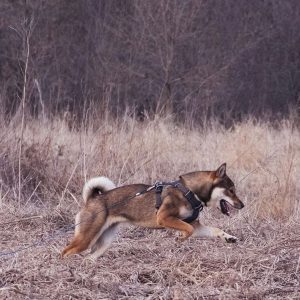
Photo credit: Iman Lau, Instagram @stellar.collision
- an independent thinker, inquisitive, impulsive, and/or rude. Shikoku were bred to hunt in small packs of three to five dogs and to act independently of the hunter. As a result, your Shikoku is likely to be inquisitive and a problem solver. Their independent nature and confidence can often make Shikoku impulsive and rude. An unsupervised Shikoku can get into a lot of mischief. This requires you to pay a lot of attention to your Shikoku, and/or deal with the mess that he makes when you don't pay attention to him.
- filled with endless energy. The Shikoku's hunting background means that more often than not they have some very impressive stamina. Further, their drive to hunt often times will cause them to continue to play/chase/run long after they are over tired and may result in some negative behaviors. Many Shikoku owners find that at least two long (around an hour) leashed walks per day plus plenty of time to run in a safely fenced enclosure is necessary to keep your Shikoku happy. Since the Shikoku require a lot of physical stimulation, being able to devote that time to them is crucial.
- interested in chasing anything that moves, including your cat, squirrels, other dogs, leaves, etc. Shikoku are working hunting dogs and they will chase everything. These dogs are the result of hundreds of years of selective breeding to produce powerful hunters with strong instincts to chase and bay prey. While some owners have been successful at training their Shikoku to recall off of "prey", it requires a lot of dedicated training, and may not work on every Shikoku.
- unreliable off leash. The same characteristics that make Shikoku prized hunters in Japan, make them poor candidates to be off leash in uncontrolled environments. If you are looking for a velcro dog that will stay at your side while hiking or can be let outside without a leash or fenced yard, the Shikoku is not the dog for you. It will take a lot of dedicated training to work with your Shikoku to be off leash, but it is important to remember they can be unreliable. Some extremely driven individuals may never achieve solid recall around distractions.
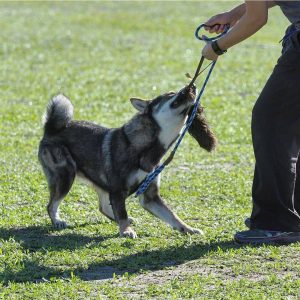
Photo credit: Instagram @koudatheshiba
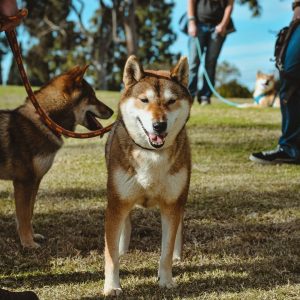
Photo credit: Instagram @rumomeetstheworld
- somewhat mouthy and vocal. Shikoku tend to have a pretty "soft mouth" (meaning they don't bite very hard) and they use it a lot. Many owners report their dogs giving "mouth hugs" to their arms or nibbling on their earlobes/hair/etc. when they want attention. Further, Shikoku have a unique style of vocalization that involves a lot of growling. To those unfamiliar with the breed, this may be taken as a sign of "aggression" or a warning. This is just one of the reasons that Shikoku are not considered good "dog park" dogs. Other people and dogs may react poorly to your vocal and rough-playing Shikoku.
- people friendly but aloof to strangers. In general, Shikoku love people. More often than not, Shikoku will greet strangers with some jumping/lunging, wagging tails, and lots of licks and nibbles. Others will appear to ignore strangers, even while accepting pets. Some Shikoku have an almost suspicious way of investigating new people. Because of their naturally aloof nature, it is very important to ensure they are thoroughly - and more importantly - correctly socialized with people early on. The socialization period ends at about 12-13 weeks, but continued positive exposure throughout your Shikoku's life will help keep them from developing fear, nervousness, or aggression to strangers. When socializing, avoid letting strangers grab or startle your puppy as this can create a negative association to humans. Encourage people to let them approach on their own and then reward once they have made the decision to investigate. Your Shikoku is likely to be very alert to changes in his environment and will not hesitate to alert you to the presence of an uninvited stranger. Shikoku tend to alert using high pitched or deep baying barks and/or growling. While some Shikoku will back away from a confrontation with a stranger rather than engage the threat, others will happily stand their ground if not taught to disengage when startled. Watch one of the videos on YouTube of a Shikoku facing a boar to get an idea of how they handle confrontation.
- highly dog reactive and predisposed to barrier frustration. It seems most Shikoku have a very strict set of rules governing social interactions with other dogs. When those rules are broken, they aren't afraid to let other dogs know how they feel about it. Your Shikoku may approach other dogs courteously, but get offended at extended eye contact or an unfriendly body posture. Their reactions can range from growling to lunging and correcting. Shikoku are NOT AGGRESSIVE dogs, but can be dog-selective and likely not tolerate interactions with a dog they haven't accepted. Barriers, such as leashes or fences, can further frustrate Shikoku. When meeting new dogs on leash or through a fence, Shikoku may put on a display with lots of vocalizing and lunging. It is best to introduce your Shikoku to new dogs either on a walk so that they are more focused on migration than they are on each other, or off leash in a controlled environment. If this isn't an option, avoid letting the dogs meet face to face. The highly reactive nature of the Shikoku is the main reason we don't recommend them for the novice dog owner.
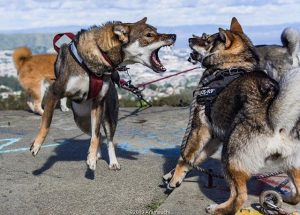
Photo credit: Instagram @kuma_kiyomi_keiko
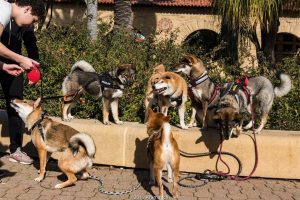
Photo credit: Instagram @kuma_kiyomi_keiko
- a highly social creature. Shikoku crave the attention of and playtime with other dogs. They are capable of building lasting friendships with other dogs, but introductions and early play sessions MUST be closely supervised to avoid any reactive behaviors escalating. Early socialization is vitally important to ensure your Shikoku develops manners and learns appropriate play boundaries. Especially as puppies, Shikoku can be relentless in their efforts to play with other dogs. If you already have a senior dog who isn't interested in play with a puppy, you will have to work hard to keep your puppy entertained and give your other dog plenty of space away from the puppy. It is also crucial that puppies are socialized with many different types of well-balanced dogs early on. The old-school mentality of letting older dogs correct a puppy to "teach them" better manners is not true and can lead to reactivity and poor social skills later in life. If a dog is snapped at or pinned down, that is very likely how they will interact with other dogs. Here is a great video that discusses the pros of carefully selecting dogs to socialize with your puppy with.
- handler soft. Despite being a very tough and hardy breed, Shikoku tend not to respond well to punitive training methods. Your Shikoku will likely be very in tune to you as a handler. They have a relative eagerness to please their owners, and can get extremely upset or depressed if harsh correction or punishment is used during training. Many American hunting breeds are trained using "stimulation" or "shock collars" to correct unwanted behavior. Those that work Shikoku will tell you punitive methods are the fastest way to ruin a Shikoku. They will "shut down" and become unresponsive to everything. See our links for some pointers to information on positive reinforcement training methods.
- a loyal and loving family member. Shikoku have long been prized by the Japanese for their ability to be loving and loyal family members by night, and tenacious hunters of large game during the day. Whether or not you choose to hunt with your Shikoku, they need to live with their family. Shikoku are likely to be happiest near their people and may become depressed if kenneled outside away from the family. When not running around outside, the Shikoku will be happy to play with a toy at your feet or sleep on a bed or the couch near you. They like to know where you are, but won't necessarily follow you around. Their devotion to their family is deep and they show it subtly. Many Shikoku are also capable of developing strong bonds with different people (especially when young) rather than being a "one-person" kind of dog.
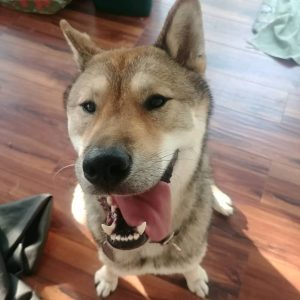
Photo credit: Instagram @b_sherail
The information above generalizes what it is like to own a high prey drive working dog, even though each dog will vary. Many of the characteristics listed above are not things easily changed by training. While many Shikoku tend to mellow out with age, this breed tends to mature somewhat slowly. Be prepared for 2-3 years of wild and crazy Shikoku puppy antics, but know that once you get past it Shikoku are loving and rewarding dogs to live with. Shikoku enthusiasts love their dogs because of or in spite of the quirks described. If a Shikoku doesn't fit your lifestyle there are many other breeds of dog that may fit more easily into your family, including some of the other Nihon Ken. If you are unsure whether or not your family is appropriate for a Shikoku, take some time to contact the breeders listed on our website. All of them will be more than happy to help you determine if a Shikoku is right for you. We also recommend joining the Shikoku Facebook Group or Nihon Ken Forum and speak directly with other Shikoku owners. Our events page will also provide information on where you may be able to meet Shikoku and their owners.
